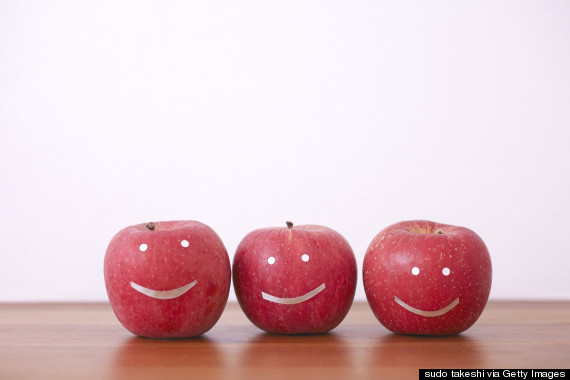We all have different ideas of how to achieve total bliss. For some it’s in the company of loved ones, for others it’s following their passions — but is there more to it when it comes to the bigger picture of happiness?
It turns out there are a lot of factors that can affect whether you’re sporting a sunny disposition. Ranging from mindful presence to the scents in the air, you may not even know these influencers could be contributing to your overall life satisfaction. In honor of the International Day of Happiness, below are 27 scientifically-backed facts that you need to know about getting to your happy place.
It’s a choice.

As Aristotle once said, “Happiness depends upon ourselves.” Perhaps the most simple way we can find bliss is to accept that it’s completely up to us.
As much as 40 percent of our happiness levels are within our control, according to some happiness researchers. In order to turn happiness into something you create, adopt small habits — such as lingering on positive moments and forcing yourself to smile — and you’ll start to feel joy on your own.
The weather can influence happy feelings.
If you live in temperate climate, there’s a chance you may be a more cheerful individual. Some research has discovered that there is a correlation between milder summers and winters and happiness. And just as mild climates can boost your mood, harsher climates can have a negative effect. During the winter months, many suffer from Seasonal Affective Disorder, mainly due to the lack of light that comes with the season.
Happiness has a fragrance.

If you’re looking to feel more cheerful, it may be time to stop and smell the roses — literally. Researchers at the University of Florida found that the flower’s smell has a positive influence on your emotions. Studies have also found that certain perfumes can have a prosocial effect and make people more altruistic.
Music can elevate your happiness.
Upbeat music = upbeat mindset? According to a study published in the Journal of Positive Psychology, those who listened to rousing music were better able to put themselves in a positive mood.
Happiness grows when you’re older.
It may be time to forget everything you thought you knew about happiness and youth. Results from a 2013 Harris Poll revealed that life satisfaction is higher for older adults than young adults. Nearly 50 percent of Americans over the age of 65 are very happy, compared to just 31 percent of those ages 18-24.
Giving to others can give you a happiness boost.
Whether it’s through helping charity or just a small act of kindness, altruism makes us feel good. One study even found that the happiness gleaned from volunteering can increase your longevity.
Joy is contagious.
Connecting yourself to happy people will make you happier too, according to a study published in the British Medical Journal. The research uncovered that if a close friend is happy, it increases the likelihood that you’ll feel happier by 15 percent. Even being near people who you don’t know very well — or “third-degree friends” — will increase your chance for joy by 6 percent.
Getting a little nostalgic can help you look on the bright side.

Reflecting fondly on the past can make you look forward to the future, according to a Personality and Psychology Bulletin study. Researchers discovered that past memories help maintain feelings of self-worth and promote optimism for what’s to come. Allowing yourself to feel nostalgic will also help you to feel less lonely. Sounds like a good excuse to flip through those old photo albums!
Happy people prefer deeper conversations.
Exuberant human beings are social butterflies — but only if you forgo the trivial small talk. Researchers at the University of Arizona discovered that a spike in happiness occurred during social interactions when people were engaged in more substantive conversations.
Quick thinking is associated with positive feelings.
If you have a quick wit or pride yourself on being a fast reader, you may also have a more positive mood. A study published in Psychological Science discovered that happiness was more commonly associated with faster cognitive thoughts.
Job satisfaction can impact your happiness.
An examination published in the Journal of Occupational and Organizational Psychology linked happiness with work to overall happiness and life satisfaction. Another study conducted by the University of Aberdeen revealed that job fulfillment was ranked as one of the most critical factors to overall well-being and happiness.
There are approximately 18 different types of smiles.

Scientists have classified expressions that range from an amused smile to an embarrassed smile.
Certain foods can make you happier.
The key to a quick boost of happiness may lie in your diet. Foods like nuts, chicken and milk all contain higher levels of tryptophan, which can lead to the production of serotonin, a chemical that helps induce calm and happiness.
Marriage protects against declines in happiness during adulthood.
But all family structures bring their own joy: Although childless married couples ranked as happiest in a recent study conducted by the United Kingdom’s Open University, the survey’s results also revealed that mothers are the most content with life overall compared to any other group.
Getting some shuteye can help you retain more positive thoughts.

In an observation of sleep-deprived college students, one experiment found that the participants remembered fewer positive words from a list of words they had previously memorized. It works the other way too, as a 2013 Cornell study found that a happy outlook on life will help you get a better night’s sleep.
The happiest country is in Europe.
For the second year in a row, Denmark was crowned the globe’s happiest country according to the United Nation’s World Happiness Report. The U.S. ranked 17th, falling six places from last year’s spot.
Practicing gratitude can help you lead a happier life.
When you’re thankful, you’re more likely to be a more joyful person according to researchers at the University of California, Berkeley. Expressing gratitude has also been proven to generate a more optimistic outlook on life and can even help lower stress. “Life is a series of problems that have to be solved — and a lot of times those problems cause stress,” Dr. Robert Emmons, gratitude researcher and psychology professor at the University of California, Davis, told HuffPost Healthy Living. “Gratitude can be that stress buster.”
Pets make you happier.

When we pet our furry friends, oxytocin (also known as “the cuddle hormone”) releases in our brains, making us instantly happier. The chemical also helps to reduce stress levels and lowers our blood pressure.
People are happier in the mornings.
When the sun rises, so does your mood. One Cornell study found that the brightest periods of the day are when you first get out of bed. Researchers analyzed the tweets of 2.4 million people across the globe and found peaks in positive messages at the start of the day, the tones of which grew more negative as the hours passed.
Exercise can make you a more exuberant person.
Bad day? Running it out may be your solution. Research has shown that just 20 minutes of physical activity can have subtle, positive mood benefits that can last far beyond the extension of your workout, SELF Magazine reported. Feel-good chemicals, like serotonin, dopamine and norepinephrin, all rise during exercise.
Our brains tend to have a negativity bias — but it’s possible to overcome it.
Although we naturally dwell on the negative, there are ways to wire your brain to focus on the joy. According to Rick Hanson, author of Hardwiring Happiness: The New Brain Science Of Contentment, Calm and Confidence, all it takes is spending more time lingering on the positive in order to train your brain to naturally focus on happy moments over time. “[Lingering on the positive] improves the encoding of passing mental states into lasting neural traits,” Hanson told HuffPost Healthy Living. “That’s the key here: we’re trying to get the good stuff into us. And that means turning our passing positive experiences into lasting emotional memories.”
Your happiness minimally depends on external circumstances like owning a house or a car.
According to Sonja Lyubomirsky, author of The How of Happiness: A Scientific Approach to Getting the Life you Want, the composition of our happiness rarely depends on our bank accounts or our physical attractiveness, because we adapt quickly to most situations. “Ultimately, whether we drive a battered truck or a Lexus to work; whether we have hypertension or asthma, our ability to be happy and get happier doesn’t vary much,” she told U.S. News in 2008.
And although our genes may count for approximately half of our happiness levels, that doesn’t mean we can’t learn to be more joyful. “You can teach yourself optimism and happiness just like you teach yourself a new language,” happiness researcher Shawn Achor told Women’s Health. “You’ll be just your genes unless you make positive habits in your life.”
Experiences are worth more than possessions.
Looking to make a purchase? You may want to look into a vacation or a concert — it will make you happier in the long run. A San Francisco State University study surveyed nearly 160 participants and the results showed that, while most didn’t regret their purchases, those who focused on their experiences showed a higher satisfaction long after the moment or event passed.
We shouldn’t constantly try to pursue happiness.
Focusing too much on happiness may be doing you more harm than good in the long run. Researchers out of the University of California, Berkeley found that a constant pursuit of happiness can even start to feel lonely. In a blog post on Psychology Today, psychologist Douglas Kenrick explained why getting caught up in chasing happiness can ultimately lead to dissatisfaction:
The paradox is that you don’t want to directly seek happiness as an end in itself. Instead, happiness, contentment, and satisfaction are all natural consequences of other activities, such as productive work, and ironically, going out of your way to make other people happy … If you set up the expectation that your life will be like a series of episodes from a happy 1950s situation comedy, supplemented with a bigger modern house, a new car every year, all the latest technological gadgets, and exciting vacation adventures, you’re sure to be disappointed. If you expect it to be more like, well, real life, and you do what you can to make that real life easier on the other people around you, well, you might just find yourself better off.
Positive emotions can make you more resilient.

People who view their lives with a more optimistic attitude are able to come back from their challenges better, according to one study by the University of North Carolina at Chapel Hill. Participants who were more open to looking at smaller moments in a positive light were more able to rebound from adversity and better manage stress. Having a positive mood also helps people become more resilient physically — the study also found that those who had happier outlooks were able to stabilize their heart rates more quickly than those who were influenced by negativity.
There is a difference between a happy life and a meaningful one.
It’s no secret that being happy adds value and meaning to your life (and vice versa), but according to recent research the two aren’t always one and the same. Research published in the Journal of Positive Psychology suggests that while there’s often some overlap, happiness is directly tied with getting what we seek — whether that’s money, relationships or other circumstances — where meaningfulness deals more with giving back and effort.
Researchers also found that living a meaningful life includes more stress and challenges and involves looking at the past, present and future. Meanwhile, those seeking happiness mainly focus on the present moment.
The older you get, the happier you are with ordinary moments.
Researchers at Dartmouth College and the University of Pennsylvania surveyed participants on how extraordinary and ordinary experiences contributed to their overall happiness and discovered as we get older, it’s the little things that make a difference. No matter the age, extraordinary moments always created a spike in happiness, but older adults were much more satisfied with the simple experiences. Older individuals saw these tiny moments as more self-defining than younger participants.







